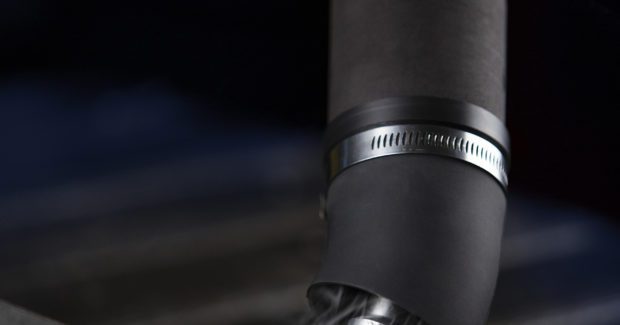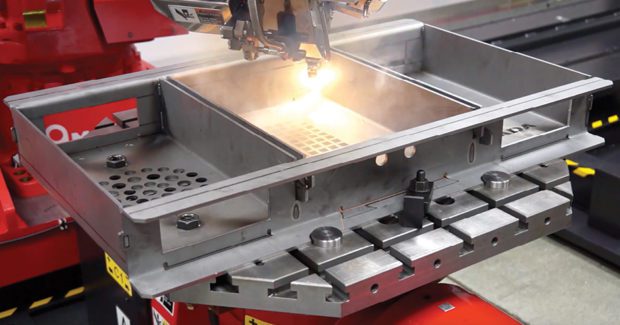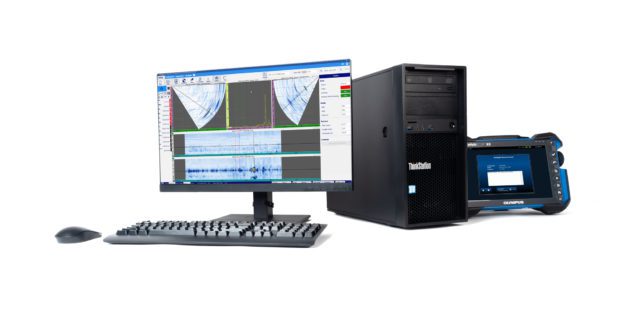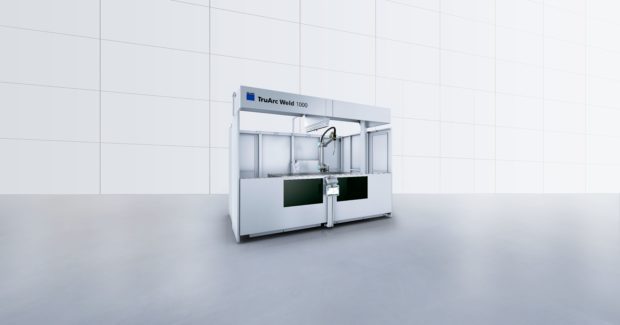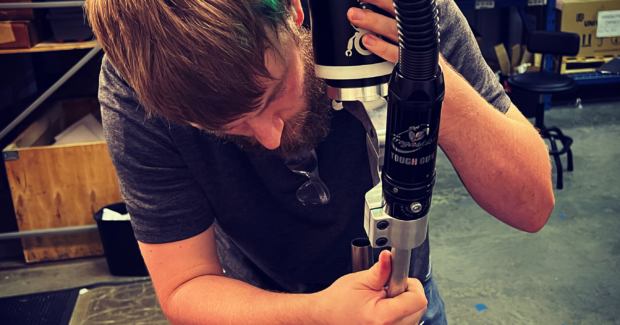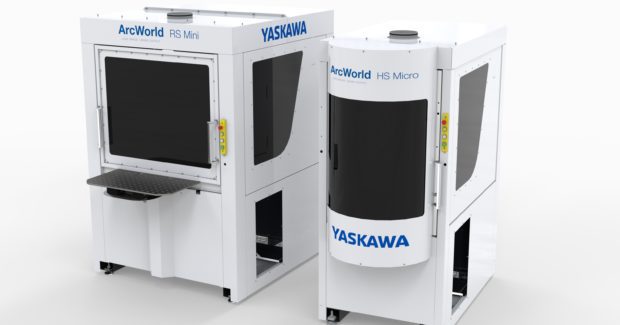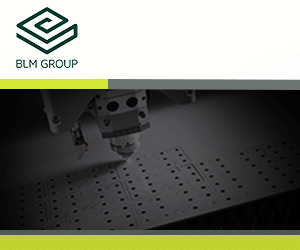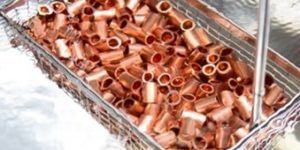Home /
Take Your Weld Process to the Next Level Take Your Weld Process to the Next Level
Bolster your welding solutions by tapping into innovative and industry-leading robotic welding applications.
Posted: June 17, 2022
The xFUME ROBO captures more than 95% of weld fumes.
The FLW is equipped with a patented rotating lens.
WeldSite Remote Connect app for the OmniScan X3
The TruArc Weld 1000 comes with a collaborative robot.
With the Cobot Welder, there is no need to have a robotics degree or even experience with programming.
Yaskawa Motoman’s ArcWorld RS, left, and ArcWorld HS, right.
Easy-to-use systems mean your welders don’t require prior training in robotics to run the systems, which can be up and running in just a few hours.
At-the-Source Fume Extraction for Robotic Applications
Until now, fume extraction in robotic applications was achieved through hooded cells and large, costly central ventilation systems — but not anymore. ABICOR BINZEL (Frederick, MD) has developed at-the-source fume extraction for robotic applications: the xFUME™ ROBO.
Using a fume collector body that fits onto ABICOR BINZEL robotic torches, the xFUME ROBO can capture more than 95% of weld fumes. With various hose management options and flexible suction boot design, the xFUME ROBO will integrate into your current operations without interfering with robot flexibility or access. In most cases, no TCP changes are required to start using the xFUME ROBO.
The xFUME ROBO is available for all widely used robot OEMs and fits onto existing ABICOR BINZEL robotic torches.
https://hubs.li/Q01blTyq0
Achieve High-speed, High-quality Welds Not Possible with a Conventional Laser Welder
AMADA America Inc.’s (Schaumburg, IL) FLW 3000 ENSIS Fiber Laser Welder is a complete welding solution that takes laser welding to a higher level of precision and productivity. The ENSIS fiber laser technology provides Process Range Expansion by ensuring precise, high-speed results, even when processing reflective materials such as brass and copper. The FLW is equipped with a patented rotating lens. With this unique feature, the laser beam is no longer aligned with a specific point along the target path — instead, it circles within a small area as it is welding.
A rotating lens makes it possible to bridge larger and uneven gap sizes while producing a clean, even weld. The heat input into the material is also optimized and results in precisely defined weld edges with virtually no unnecessary deposits of material. Additional features of the FLW include:
- Automatic Beam Focus — Adjusts the focus lens to an optimum setting based on the set welding conditions
- Beam weaving by lens rotation versus robot axis rotation produces fast, accurate and smooth results
- Teaching Assist System — Uses a CCD camera to accurately compensate for any deviation from the targeted welding path
- AMADA’s FLW-CAM software improves user efficiency through offline robot teaching — simulating movements based on 3D data
- A large reduction in electricity costs is made possible due to a high heat exchange efficiency. Maintenance cycles are also improved due to the reduction of mirrors and other optical components
The ENSIS 3000 fiber laser engine contains a Variable Beam Control Unit that automatically adjusts the laser beam’s properties to process a wide range of materials and thicknesses. The innovative design of AMADA’s fiber engine results in 3kW of power generated with a single module — eliminating the need for a combiner and reducing overall power consumption. The simplified design does not require laser gas, mirrors, or any other items typically associated with CO2 beam generation. The ENSIS FLW provides economical operation, high-speed welding of thin material, and superior weld quality on thick plate.
www.amada.com/america
App for Portable, Fast Weld Inspection of Complex and Oversized Parts
The WeldSight™ Remote Connect app for the OmniScan™ X3 phased array flaw detector streamlines the weld inspection workflow by enabling users to perform every step via WeldSight software on a PC or laptop. Combined with Evident (formerly Olympus) (Waltham, MA) scanners and probes, this phased array ultrasonic testing solution minimizes manufacturing delays caused by inefficient nondestructive testing methods.
With the app downloaded on an OmniScan X3, the user can control the unit using WeldSight software on a connected computer. The flaw detector and software combine to become an efficient, high-performance, portable inspection solution that is also cost effective. Manufacturers can create customized equipment setups optimized for new weld inspections in oversized parts as well as complex configurations using multiple groups and probes, scanners and monitors.www.olympus-ims.com/weldsight/
Automated Arc Welding Easier Than Ever
TRUMPF’s (Farmington, CT) TruArc Weld 1000 comes with a collaborative robot known as a “cobot”
that assists in the creation of the program, rather than relying on values from an
offline source or entering positioning data into a control. After the operator manually
guides the cobot over a part, it automatically creates the weld program. CE-compliant and approved by TÜV Austria, the TruArc Weld 1000 meets the very highest safety standards.
Equipped with an operating unit, the cobot allows users to store the weld path’s start and end points as well as intermediate points in order to create the program. Furthermore, the cobot control system includes templates for welding programs and parameters that cover scenarios such as different sheet thicknesses. It also offers an automated alternative for many parts that users would normally weld manually.
Inside the TruArc Weld 1000 is a partition that can be moved up and down, which allows users to divide up the working area and choose between welding in a single-station operation or a two-station operation. In single-station operation, the cobot can weld parts measuring up to 80 x 24 x 24 inches. Other ratios of width to length are also possible depending on part dimensions. In two-station operation, the TruArc Weld 1000 can process smaller parts measuring up to 24 x 24 x 24 inches. To ensure it can easily reach both stations, the cobot travels between two stations along a linear axis. While the cobot is performing welding on one side, the operator can use the time to set up a part on the other side.
www.trumpf.com
Cobot Welder App
Manufacturers finally have simple, flexible welding automation for their small batch production needs. Enter cobots. By leveraging cobots for welding automation, manufacturers can easily see a 300% improvement in productivity and often much higher. Cobots unlock “lead-through-teaching” that eliminates the need to jog the robot with a teach pendant, and most cobot welding systems have a very small footprint.
The Cobot Welder from Hirebotics (Nashville, TN) and powered by Universal Robots USA’s (Ann Arbor, MI) UR10e, empowers welders to take advantage of automation without the need for robot programmers thanks to an app-based interface. This way of teaching the robot was created with welders in mind.
www.universal-robots.com
Compact Workcells Easily Integrate Robotics into Weld Processes
The newest models of Yaskawa Motoman’s (Dayton, OH) ArcWorld® family of pre-engineered robotic arc welding workcells, the ArcWorld RS and ArcWorld HS, deliver a highly flexible, compact and cost-effective option for integrating robotics into weld processes. Ideal for replacing or supplementing manual welding, such as pre-assembly before welding in larger robotic workcells, each solution is designed for optimizing small- to medium-size part production for medium volume fabrication.
Requiring only 2.3 square meters (25 sq. ft.) of floorspace, the ArcWorld RS utilizes a rotating station (RS) design, manually indexed by the operator, featuring two fixture tables with a 100 kg payload capacity per side. This facilitates quick changeover, allowing parts to be safely loaded and unloaded while the opposite station part is welded. Parts up to 425 x 700 x 990 mm can be processed.
More compact, the ArcWorld HS needs 1.4 square meters (15 sq. ft.) of floorspace and offers a hinged station (HS) design, allowing easy access for loading and unloading parts. The workcell features a single fixture table with a 100 kg payload capacity and can process parts up to 550 x 500 x 1050 mm in size. The workcells are compliant with ANSI/RIA R15.06-2012, and other relevant ISO and CSA standards.
www.motoman.com
Subscribe to learn the latest in manufacturing.
|
|
Subscribe to learn the latest in manufacturing.





